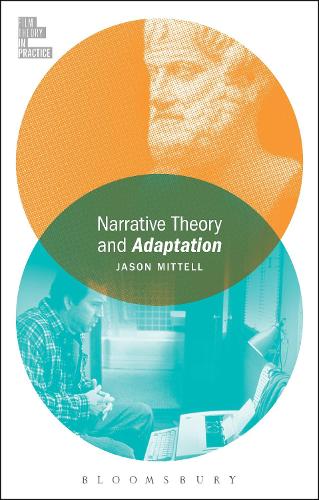
Narrative Theory and Adaptation.
(Hardback)
Available Formats
Publishing Details
Narrative Theory and Adaptation.
By (Author) Professor Jason Mittell
Bloomsbury Publishing PLC
Bloomsbury Academic USA
20th April 2017
United States
Classifications
Professional and Scholarly
Non Fiction
791.436
Physical Properties
Hardback
152
Width 127mm, Height 197mm
286g
Description
Narrative Theory and Adaptation offers a concise introduction to narrative theory in jargon-free language and shows how this theory can be deployed to interpret Spike Jonzes critically acclaimed 2002 film Adaptation. Understanding narrative theory is crucial to make sense of the award-winning film Adaptation. The book explicates, in clear prose for beginners, four key facets important to the narrative theory of film: the distinction between practical vs. critical theory, the role of adaptation, the process of narrative comprehension, and notions of authorship. It then works to unlock Adaptation using these four keys in succession, considering how the film demands a theoretical understanding of the storytelling process. In using this unusual case study of a film, the author makes the case for the importance of narrative theory as a general perspective for filmmakers, critics, and viewers alike.
Reviews
Everything you always wanted to know about narrative theory, refracted through the ground-breaking, rule-breaking movie Adaptation. In Jason Mittells hands, Spike Jonzes filming of Charlie (and his fictional brother Donald) Kaufmans screenplay of Susan Orleans The Orchid Thief becomes a one-stop shopping mall that illuminates the relations between adaptation and authorship, the differences between performances and dramatizations of real people, the results of filmmakers sending up the very models and conventions they rely on, and the reasons why budding students of adaptation will be happily occupied even if no one ever makes another movie. * Thomas Leitch, Professor, University of Delaware, USA and editor of The Oxford Handbook of Adaptation Studies *
Jason Mittell digs expertly into how and why cinematic stories are made, showing us the multiple relationships between narrative theory and artistic practice. The book illuminates character, structure, authorship, and the interpretive experience of film, using Adaptation. as an ideal test case. Mittell succeeds admirably in connecting the nitty-gritty to the conceptual, revealing that they are as intimately and provocatively intertwined as Charlie and Donald Kaufman. Anyone interested in the ecosystems of storytelling will find elucidation and intellectual rewards here. * Sean O'Sullivan, Associate Professor, Film Studies Program and Department of English, The Ohio State University, USA *
Author Bio
Jason Mittell is Professor of Film & Media Culture and American Studies at Middlebury College, USA. He is the author of Genre & Television: From Cop Shows to Cartoons in American Culture (2004), Television & American Culture (2009), Complex Television: The Poetics of Contemporary Television Storytelling (forthcoming), and co-editor of How to Watch Television (2013), as well as numerous essays about film and media studies. He runs the blog Just TV.
